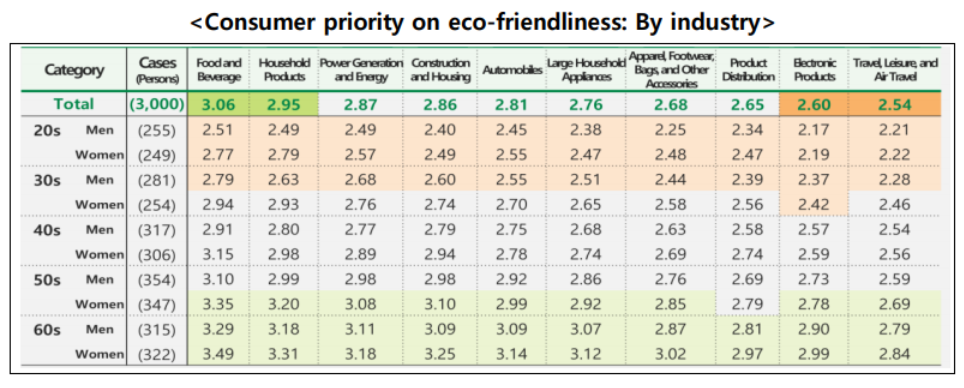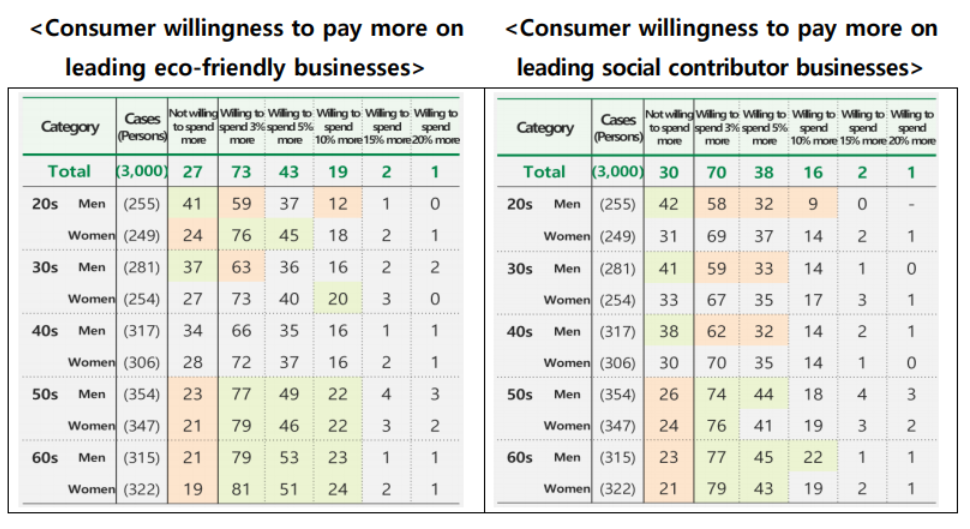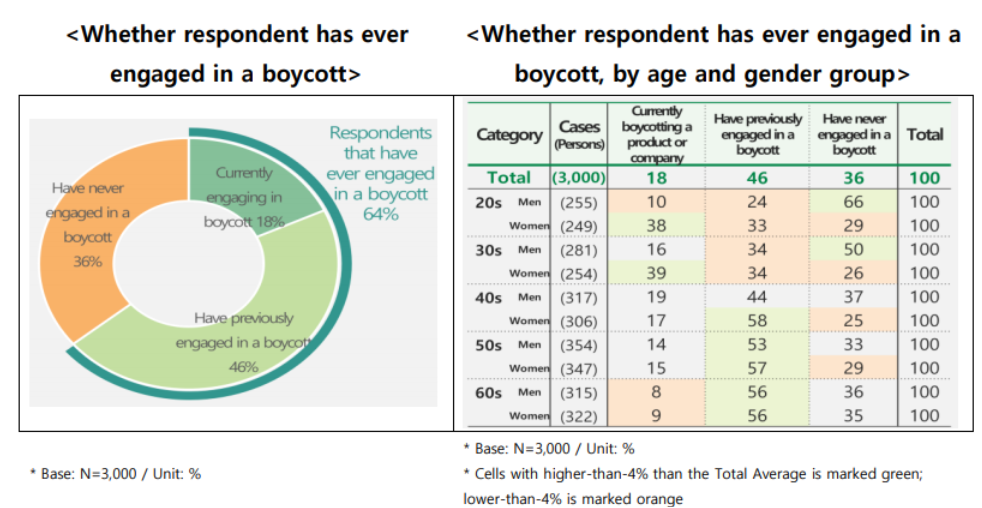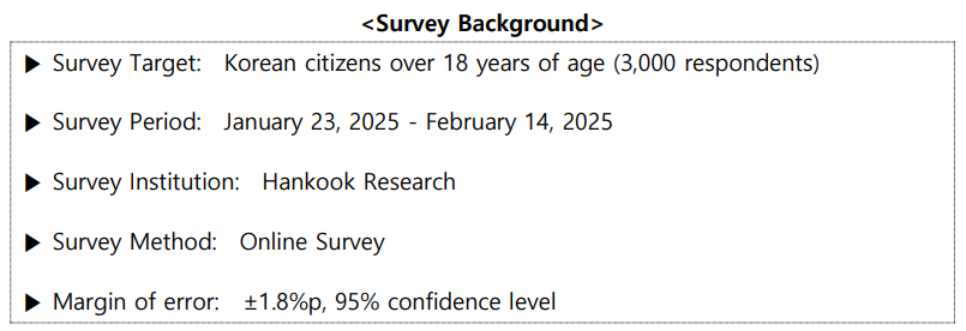7 out of 10 consumers are willing to ‘Pay more for products from leading ESG businesses’
- Over 70% of consumers are willing to ‘Pay more on leading ESG businesses’
- Consumers perceive ‘Businesses that are actively committed to eco-friendliness (35%)’ as leading ESG businesses
- Half (47%) of consumers are ‘Actively committed to ESG activities,’ and women in their 60s showed the highest commitment.
- 64% of consumers ‘Have previously engaged in a boycott’
A recent survey shows that 7 out of 10 Korean consumers are open to spending more on products from leading ESG (Environment, Society, and Governance) businesses. It finds that 64% of consumers have previously engaged in boycotting a business, indicating that ESG corporate management is a significant factor that affects consumer behavior.
The survey, titled Consumer Behavior and Perceptions on ESG, was conducted by the Federation of Korean Industries (FKI) and Hankook Research.
More than 70% of consumers are ‘willing to pay more on leading ESG businesses’
More than 70% of respondents indicated that they are ‘Open to paying more on leading ESG businesses.’ More specifically, 73% expressed a willingness to spend more on products from businesses that are leading eco-friendly businesses; and 70% of respondents indicated their willingness to spend more on products from leading social contributor businesses.
Among consumers, those in their 50s and 60s showed the highest willingness to pay more on leading ESG businesses, and 20% of this demographic indicated that they are willing to pay up to 10% higher prices for products from leading eco-friendly businesses.
Consumers perceive ‘Businesses that are actively committed to eco-friendliness’ to be leading ESG businesses
Consumers perceive leading ESG businesses to be, in the descending order, ‘Businesses actively committed to eco-friendliness (35%),’ ‘Businesses that prioritize making a positive impact over profits (23%),’ ‘Businesses that support the underserved (13%),’ ‘Businesses that have equitable operational practices, including in corporate management and recruitment (11%),’ and ‘Ethical businesses that comply with the law (10%).’ More than half (55%) of respondents held the view that the most significant factor in the in corporate ESG activities was ‘Sustained engagement.’
When it comes to industries, respondents ranked eco-friendliness as the top priority1 in the ‘Food and beverage industry (3.06)’ and the ‘Household products industry (2.95).’ However, it was considered a lower priority for the ‘Travel, leisure, and air travel industry (2.54)’ and the ‘Electronic products industry (2.60).’
1) Based on a 4-point scale: ‘It is the most important factor (4)’, ‘It is one of many important factors (3),’ ‘It is a notable but not a critical factor (2),’ ‘It is not at all an important factor(1)’)
Consumers in their 60s gave the highest priority to eco-friendliness across all industries, while those in their 20s gave it the lowest. The key criterion for judging ecofriendliness was ‘Eco-friendly certification labels2(55%)’, followed by ‘Product description on packaging (12%),’ and ‘Product name (11%).’
2) Eco-friendly certification labels (Examples): Ministry of Environment Eco-Label, Energy Star, Organic Certification, Carbon Footprint Certification, etc

Half (47%) of consumers are ‘Actively committed to ESG activities,’ and women in their 60s showed the highest commitment.
In a survey assessing consumer behavior towards ESG activities (Comprehensive Consumer ESG Score3, 4-point rating scale), 47% indicated active commitment. Older respondents, especially women within the same age group, had higher comprehensive scores. The top comprehensive scores by age and gender were, in descending order: Women in their 60s (2.63); Men in their 60s (2.58); and Women in their 50s (2.53). The lowest scores were, in ascending order were: Men their 20s (2.30); Men in their 30s (2.32); and Women in their 30s (2.35). By specific environmental focus area, Water (2.72); Energy (2.64); Household waste (2.56); and Consumer-engaged ESG activities (2.50) had higher than average (2.44) indicator figures.
3) The Comprehensive Consumer ESG Score breaks down the three ESG components, Environment (E), Society (S), and Governance (G), into distinct groups and measures specific behavior and their performance-levels in daily life. This measurement is scored and can serve as a comprehensive indicator. The Comprehensive Consumer ESG Score is the mean of all the scores across the board (4-point scale).
64% of consumers have previously boycotted a business’
When engaging in governance-related ESG actions, consumers opted to boycott a specific company’s products. The top reasons4 were because ‘The company has been the focus of public controversy (2.79),’ ‘The company has unsound financials (2.74),’ and ‘The company practices discrimination on the basis of gender, disability, etc. (2.66).’ An overall 64% answered that they have either participated in boycotts or are currently engaging in one.
4) A 4-point scale (Always committed to the boycott (4), Mostly committed to boycott (3), Rarely committed to boycott (2), Not at all committed to boycott(1)) was applied to each reason for engaging in boycotts.
The FKI noted that “The business environment is more challenging than ever due to rising protectionism from the Trump Administration and the sluggish domestic demand. Nevertheless, it is imperative that companies engage in ESG management to achieve sustained growth and be well received by the public.”
※ [Attachment] Summary Report: Survey on Consumer Behavior and Perceptions on ESG




